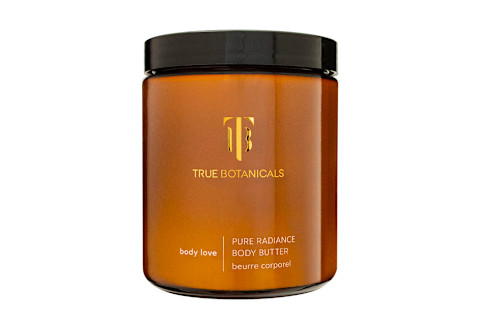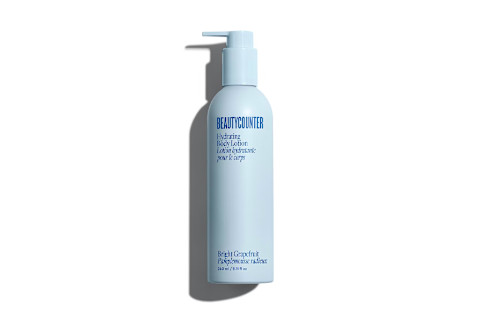What's The Difference Between Body Cream & Lotion? What You Need To Know

Call me dramatic, but there's nothing more sensorially satisfying than covering yourself with body lotion post-shower. Frosting your skin with a delicious formula is downright luxurious, and, not to mention, replenishing necessary lipids is key for supporting a healthy skin barrier.
All that to say: If I emerge from the bathroom with the glass-like skin of a slippery seal, I know I've done something right.
Selecting a hydrator, though, is a bit of a journey—while I'd argue the search for the dreamiest product is half the fun, it can also be confusing to wade through various ingredient lists and marketing claims.
For example, many shoppers are left scratching their heads when browsing body creams versus lotions: Are these two products actually different, or is it merely semantics?
Wonder no more: Here's what you need to know about using them both.
Body cream vs. lotion: What's the difference?
In a nutshell: Body creams are thicker than lotions. "Lotions have a higher water content compared to creams," says board-certified dermatologist Hadley King, M.D., which makes the consistency thinner and more spreadable. Creams, on the other hand, typically call on heavier ingredients (like shea butter and coconut oil) to create a fortress of moisture.
At the end of the day, though, there are no stringent rules for what's considered a body cream versus a lotion (you may even discover a lightweight product that calls itself a body cream or a butter-thick formula sold as a lotion).
Ultimately, we can chalk the difference up to marketing, but overall most experts agree on this textural distinction.
When to use body cream
Have a decadent cream you're dying to try? Keep these factors in mind before slathering on:
If you have a drier skin type
"Creams are thicker in consistency," says King. "They will usually have more occlusive properties." That said, body creams are typically fit for drier skin types that may need more help keeping hydration locked inside—those with dry or sensitive skin conditions (like eczema) may also find a dense cream suitable for laying the moisture on thick, adds board-certified dermatologist Jeanine Downie, M.D., co-host of The GIST Show.
During colder months or at night
Even if you don't have dry skin, you may find it helpful to fold in a body cream during chillier months: "This will be particularly important during the winter to prevent and treat dry skin, supporting the skin barrier and locking in moisture," King adds.
The timing matters, too, as the skin is more permeable at night (here's a 2016 study explaining why1), which means your skin can lose significant hydration as you sleep. That's why experts recommend applying a heavier, more occlusive moisturizer before bed to help your skin deal with transepidermal water loss2.
On your hands, knees, and elbows
Finally, you can massage a rich cream into drier portions of your body—like the hands, feet, elbows, knees, etc. Pay special attention to those paws: "They tend to be drier with constant washing," says Downie.
Our favorite body creams
When to use lotion
On the flip side, here's what to know about opting for a thinner lotion:
If you have an oilier skin type
Lotions, generally, are best for skin types that need some hydration—just not an extra-thick layer. For example, those with combination, oily, or acne-prone skin still need to hydrate (dehydrated skin just leads to more oil and breakouts, in case you need a reminder), but a lightweight water-based moisturizer will do the trick.
Those with acne-prone skin might fare better with a lotion, as these typically aren't as occlusive as their body cream counterparts—meaning, they don't include heavier ingredients (the shea butter, the coconut oil) that can be comedogenic for those prone to breakouts.
During humid months or during the day
When moisture is practically hanging from the humid air, you may find you don't need a thick-as-butter cream to help your skin stay hydrated. That said, you may reach for a lighter body product, like lotion. Again, hydrating your skin is important no matter the weather, but you may have a little wiggle room when the air is already sticky with humidity.
A thinner lotion is also best for daytime use, says King: "It's more readily absorbed by the skin and it leaves a less greasy residue." Lotions also tend to have a quicker dry-down time and an easier slip, which makes them more wearable for daytime hours (read: It won't stick to your clothes).
On your chest, back, and shoulders
"Lotions are often preferred for oilier areas," says King, or areas prone to clogged pores. Think your chest, back, shoulders, etc.
See here for our list of body lotion recommendations, make a vat of your own DIY version, or select one of the lightweight confections below.
Our favorite body lotions
Other expert tips to keep in mind
It's just about lotion versus cream that you should keep in mind, there are other factors at play if a product is right for you.
Comedogenic or not
If you have easily congested skin, you'll want to make sure whichever product you use is noncomedogenic. While body creams tend to be more occlusive (which can trap oil and bacteria and potentially lead to breakouts), don't think that lotions are an immediate safe bet. See, there is no set definition for this skin care term—so you have to peek at the individual ingredients and point out any red flags. So a lotion, while technically thinner, may wind up comedogenic, whereas a body cream may work just fine for your skin.
Fragranced or fragrance free
No matter your product, you'll also want to pay attention to fragrance: "If the body lotion or the body cream is scented, it could be more irritating," says Downie, especially if you have sensitive skin. Artificial fragrance is "one of the most common ingredients to cause sensitivity, puffiness, itch, and rash," board-certified dermatologist Loretta Ciraldo, M.D., FAAD, once told us, but even natural fragrances (essential oils and the like) can sneak into the formula and trigger irritation for some. If your skin feels itchy or irritated after you slather on a cream or lotion, you may want to opt for a fragrance-free number (these options will make your skin feel like butter).
FAQ
What is the difference between body lotion and body cream?
The only difference between body cream and lotion is the texture. Creams tend to be thicker and are closer to a solid, while lotions are more liquid in consistency. But they can share ingredients and benefits. In addition, there are no stringent rules for what's considered a body cream versus a lotion—ultimately, we can chalk the difference up to marketing, but overall most experts agree on this textural distinction.
Is body cream better than body lotion?
When comparing body cream and lotion, one isn’t better than the other—it’s entirely up to personal preference. Generally speaking, body creams are preferred for folks with dry skin and who like thicker products, where lotions are more beneficial for those with oily skin and don’t need as much moisture.
Can I use both body cream and body lotion?
You can use both body cream and lotion within the same routine. For example, you may want to use body creams at night, but lotions during the day. Or you may prefer creams in the winter and lotions in the summer. Finally, you can use them on different parts of the body: A lotion for all over, and then target with a cream.
The takeaway
Not all body creams and lotions are the exact same, but generally, creams tend to be richer and denser than lotions.
To determine which product you should use, there are a few factors to mind (skin type, time of year, and select parts of the body), but as we discussed above: Finding the best body product is a personal journey, so you may have to test some formulas before you find one you adore.
Want something that's best of both worlds? Try a light body cream, which should have a texture somewhere in the middle.





